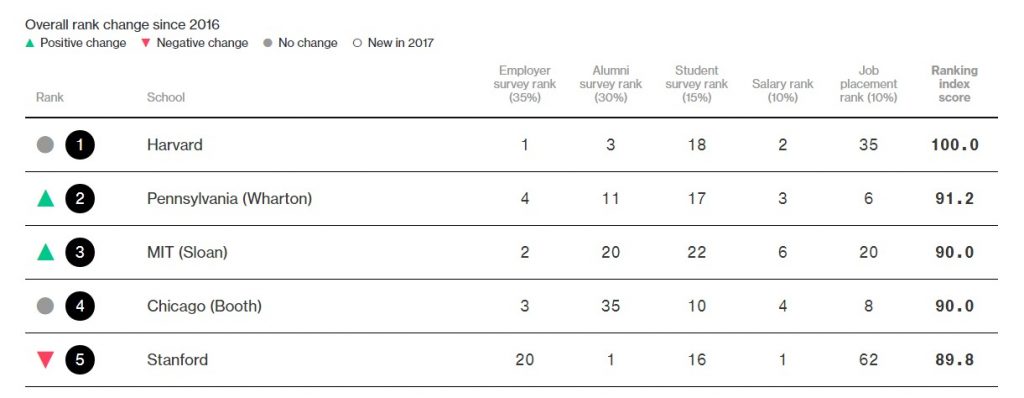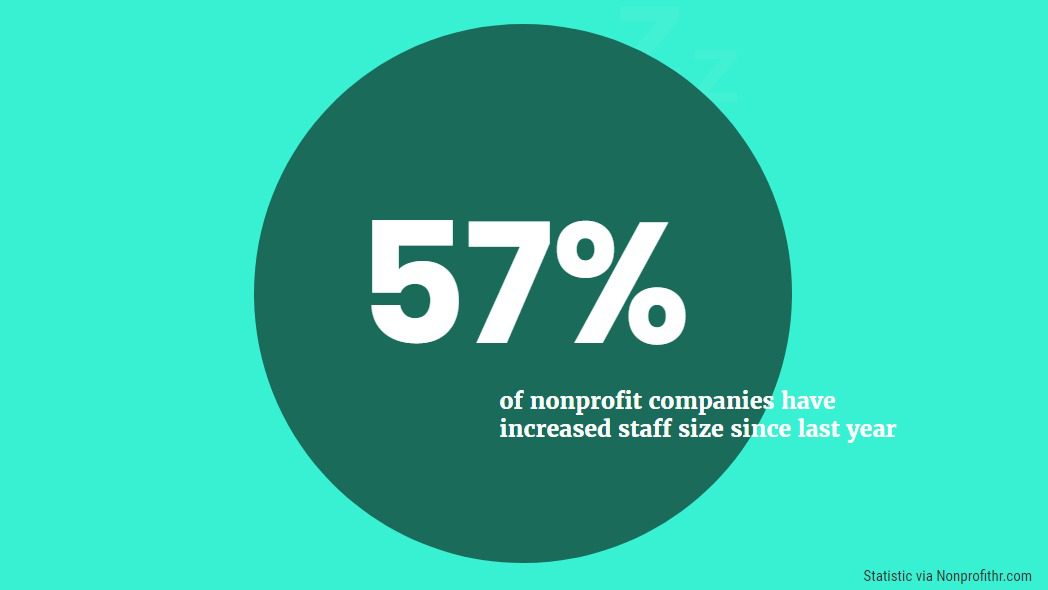Just How Much Are Stanford MBA Grads Getting Paid?

Wondering what kind of pay day you can expect if you are among the select 6 percent of applicants who gain admission to Stanford Graduate School of Business (GSB)? Are you sitting down? Perhaps you should be, because the school’s 2017 employment report—released today—reveals record-breaking salaries for the third year in a row.
On average, last year’s graduates, now in their first year of post-MBA work, are pulling down an annual base salary of $144,455—a $4,000 increase over last year’s all-time high (median base compensation was $140,000, also besting last year’s by about $4,000). But it doesn’t stop there. Average signing bonuses, reported by 51 percent of the class, are also up—setting a new record at $29,534. (Median salary bonuses remained unchanged at $25,000.) And as if that weren’t enough, another quarter of the class reported other guaranteed compensation (OGC) surpassing last year’s all-time highs by a whopping $10,000. Average OGC for 2017 grads was $83,065, and median OCG was $50,000. The range was $6,750 to $450,000.
The GSB, in announcing these most recent employment statistics, pointed out that OGC will no longer be tracked by the MBA Career Services and Employer Alliance (CSEA) and that it began last year capturing an “Expected Performance Bonus” metric in its place. This measure includes both guaranteed and non-guaranteed cash compensation based on performance. Though the average and median EPB for the Class of 2017, at $71,946 and $35,000, were each lower than OGC figures, a full 65 percent of the class expected to receive such performance-based compensation, up from 61 percent last year—and substantially higher than the quarter of grads who reported OGC. The reported range for EPB was $5,000 to $450,000.
Stanford MBAs claim higher pay days than graduates of any other school, in part thanks to higher base compensation. Stanford’s median base—$140,000—surpassed that of Harvard Business School (HBS) ($135,000), the University of Pennsylvania’s Wharton School ($130,000), and the University of Chicago Booth School of Business ($125,000). Grads from both Stanford and HBS reported the same median starting bonus of $25,000, but the $50,000 in other guaranteed compensation reported by Stanford grads was double what grads at the school’s top East Coast rival reported.
Tech Less of a Draw Than in Prior Years
Bucking the trend at many other business schools—where increasing percentages of students are clamoring to enter the technology industry—fewer Stanford MBA Class of 2017 grads headed into tech. In what the school deemed “a rebalancing of the scales among the three top industries,” interest in technology dropped 8 percentage points—to a mere 25 percent of the class. Almost a third of the class—32 percent—headed into finance, up a point over last year. Consulting, too, gained four percentage points to attract 20 percent of the most recent class.
“Our leading employers span a wide variety of industries,” Maeve Richard, assistant dean and director of the Career Management Center, said as part of a news story announcing the latest employment statistics on the Stanford GSB site. “They represent organizations in such areas as consulting, finance, technology, consumer products, healthcare, and nonprofits. What they do have in common is work environments that offer the ability to make an impact with a focus on agency, career development, diverse challenges, and responsibilities.”
Indeed, a record-setting 411 organizations hired Stanford MBA students and graduates for internships or full-time roles this past year—up 7 percent over last year and 34 percent from six years ago. A whopping 95 percent of employers hired just one or two students—an indication of the breadth both of GSB employers and student interest.
Uptick in Women Headed into Private Equity and Venture Capital
“In addition, we observed that the number of women going to private equity and venture capital has nearly doubled since 2014,” Richard said as part of the Stanford GSB article. “While we do not disclose fine-grain gender detail and the numbers are still small, we see a definite widening of the cracks in the glass ceiling.”
It’s no wonder that Stanford GSB women would increasingly be looking to break into PE and VC, since those fields yield some of the very highest pay days. The highest reported base salary for the Class of 2017—$285,000—went to a graduate headed into venture capital. Median base salaries for both PE and VC were $175,000, $40,000 higher than for the class as a whole. And it was a graduate headed into a private equity analyst role who reported the mind-boggling $450,000 in other guaranteed compensation. The median signing bonus for PE—at $50,000—was also the highest in the class (on par with investment banking). Though it was a graduate headed into a marketing role who claimed the highest signing bonus of the class, $77,000.
Timing and Location of Offers
Stanford GSB reports full-time offer and acceptance rates at graduation and three months out from graduation—as mandated by CSEA standards. But in past years—as this year—the school has made a point of underscoring the fact that its graduates’ confidence in their ability to find the perfect job sometimes means they hold out longer in accepting their ultimate position than graduates from some other schools. That said, 92 percent of the Class of 2017 had offers three months out from graduation—up two points over last year—and 88 percent had accepted offers, a five-point increase year over year.
In terms of where geographically the most recent Stanford MBA grads wound up, the West was the winner—with 62 percent of grads choosing to remain in the region. This represents a 3 percent decline compared to last year. “Counter to assumptions, only 35 percent of these West region jobs relate to technology,” the school notes. “Finance represented 26 percent, and consulting represented 15 percent.” The Northeastern United States drew the second-most Stanford grads, 16 percent of the class. Another 11 percent took international jobs.
Also of note, 16 percent of the class launched their own startups upon graduation, up one percentage point over last year. Leading industries for these entrepreneurial students include software (15 percent), finance (11 percent), healthcare (9 percent), real estate (9 percent), and internet services (9 percent).
More Grads Seek Socially Responsible Roles
Another notable shift in these most recent employment statistics is the increasing number of Stanford MBA grads heading into careers in socially responsible roles or organizations. Thirteen percent of this year’s graduates answered yes to the question, “Have you chosen a socially responsible role in a private business?” That’s up from just 8 percent last year, when the question was first introduced.
Watch this space for an upcoming piece that will highlight several Stanford students who chose internships focused on social impact this past summer—a Clear Admit exclusive.
This article has been edited and republished with permissions from our sister site, Clear Admit.
Round 1 Decision Week is Here: Harvard, Northwestern Invites Arriving Soon

At 12 p.m. EST, Harvard Business School will unveil its round 1 MBA decision invites, leading a busy week for U.S. schools.
Tomorrow, Wednesday, December 13, will feature the first round of invites for Northwestern University’s Kellogg School of Management, with the Stanford Graduate School of Business, Berkeley Haas, and The Wharton School at the University of Pennsylvania following on Thursday, December 14. And on Friday, December 15, Rice Jones, UCLA Anderson and UMD Smith will reveal their first round invites.
A handful of notable Clear Admit favorites, such as the CMU Tepper full-time MBA, Dartmouth’s Tuck School of Business, Michigan Ross, and Washington Olin, among others, will also be releasing their own first round of MBA invites.
Clear Admit offers a host of valuable tools and advice for those waiting on the edge of their seats, including MBA LiveWire, DecisionWire, and ApplyWire.
Stay up to date with MetroMBA and Clear Admit for more information on the world’s best business schools and upcoming invites.
Columbia Business School Announces New M.S. in Business Analytics Degree

Columbia Business School (CBS), together with Columbia Engineering, yesterday announced a new full-time Master of Science in Business Analytics degree. Distinct from CBS’s MBA degree, the new program features a three-semester curriculum and is really geared toward students who want to learn the modeling techniques and data science tools that help businesses use data to influence decision making. A unique capstone project will serve as a key element of the new program, through which students will work with actual clients and relevant data sets to put the skills they’ve learned to work helping solve those companies’ real-world business problems. The capstone course will extend over the full three semesters of the program.
The program was developed jointly by faculty at both CBS and Columbia Engineering, and the resulting curriculum is designed to prepare graduates to excel in careers both as consulting analysts and associates and as business analysts and data scientists in fields including financial and professional services, technology, advertising and media, and other professions that require both a deep understanding and practical application of data analytics.
“By tapping into the vibrant and diverse business ecosystem that can only be found in New York, Columbia Business School and Columbia Engineering are uniquely situated to offer this new Master’s degree,” CBS Dean Glenn Hubbard said in a statement. “We see this as a must-do program for any future business person who wants to have a leg up in using data to make informed business decisions.”
CBS Enters an Already Crowded Field
Columbia is far from the first to announce a new data analytics master’s program—and it likely won’t be the last. It joins a long and growing list of other leading business schools that have sensed demand from both students and recruiters for programs that marry some of the skill sets of the MBA with the deeper study of data science and analytics that engineering faculty can provide.
MIT Sloan School of Management last year launched its own Master of Business Analytics (MBAn) degree, with leadership and support from the MIT Operations Research Center. In just one year, applications to the program have more than doubled—from 300 to 800—making the degree the most competitive at the school, with an admissions rate of less than 4 percent, the school reports. And just last month Sloan unveiled a new Business Analytics Certificate program that will be open to students in all MIT masters-level programs who want more rigorous academic content focused on data science.
Not to be left out, last month the University of Virginia’s Darden School of Business announced the launch of a new MBA+MSDS dual-degree program, which grants a Master of Data Science degree from UVA’s Data Science Institute and an MBA from Darden in 24 months (tuition for the MBA+MSDA program is the sum of each individual program’s standalone tuition). The program welcomed a pilot cohort this past summer, and Darden is currently accepting applications for the full program, which will launch in 2018.
NYU Stern, for its part, is now accepting applications for the inaugural class of a new specialized one-year Tech MBA, first announced last spring. And just yesterday Stern shared that an $8 million alumni gift will fund creation of a new center for technology, business, and innovation.
YOU MIGHT ALSO LIKE: More Business Schools Training MBA Students for Careers in Tech
Harvard Business School (HBS), too, sees where the action’s at and doesn’t intend to sit idly on the sidelines. In August 2017—together with the Harvard John A. Paulson School of Engineering and Applied Sciences and the Faculty of Arts and Sciences—HBS announced a partnership with 2U, Inc. to deliver a new online certificate program in business analytics. Expected to welcome its first cohort of students in March 2018, the Harvard Business Analytics Certificate Program is designed to help business leaders—including MBA grads—keep up with and leverage the explosion of data now available in every industry.
Some Schools Were Out in Front
Of course, amid this recent flurry of activity to enhance academic offerings at the intersection of technology and business, some schools can claim clear first-mover advantage. MBA students at CMU’s Tepper School of Business can opt to pursue a Technology Leadership MBA Track, a joint partnership between the Tepper School and Carnegie Mellon’s top-ranked School of Computer Science—indeed, it is one of the most popular offerings in the MBA program. Tepper also offers a three-year, dual-degree MBA/Master of Software Engineering program, also in partnership with the School of Computer Science.
And Stanford Graduate School of Business has for several years offered its students the opportunity to pursue a dual degree of significant relevance to students interested in careers in tech. Its joint MA in Computer Science/MBA degree links two of the university’s world-class programs and helps students develop a unique skill set ideal for becoming a manager and/or entrepreneur for new technology ventures. Stanford’s program includes a year of courses at each the GSB and in the Computer Science department followed by a third year of elective courses in both programs, enabling students to shave off one to two semesters it would take to complete both degrees separately.
RELATED: Best Business Schools to Jumpstart Your Career in Tech—Or Advance It
It Only Makes Sense
Whether beginning several years ago or just getting off the ground now, that business schools are recognizing and responding to market demand for business fundamentals married with data science know-how makes complete sense.
“The role of analytics has grown increasingly critical for most sectors of the economy,” Columbia Engineering Dean Mary C. Boyce said in a press release. “Our partnership with Columbia Business School combines our strength in data science, optimization, stochastic modeling, and analytics with their strength in data-driven decision-making for business and marketing to create a rigorous new master’s degree program.”
What Sets Columbia’s New Program Apart?
So what sets the newest program announced yesterday by Columbia apart from others in a crowded field? One distinguishing feature of the M.S. in Business Analytics is the capstone project that will put students to work on real-life consulting projects with companies using the companies’ own data, the school argues. “By working on real-world consulting projects, with real-world data, students will use the modeling techniques and data science tools to provide pragmatic solutions to the practical problems that businesses are facing today,” Costis Maglaras, professor and chair of CBS’s Decision, Risk & Operations Division, said in a press release.
Students in the new Columbia Business analytics degree program will also have valuable access to dedicated career placement services, the school notes, starting with completing a required Professional Development and Leadership course. “The M.S. in Business Analytics combines classroom instruction by distinguished Columbia professors with the experience of working on real-world problems via the capstone project course,” Columbia Engineering Professor Garud Iyengar said in the press release. “We expect this program to have 100 percent placement of its graduates as do our very successful M.S. in Management Science and Engineering and M.S. in Financial Engineering programs.”
Applications are currently being accepted for the first cohort of this new M.S. in Business Analytics. Students can choose to complete the program in one year by taking a summer semester or can take three non-contiguous semesters (fall, spring, fall), which would reserve the possibility of a summer internship.
For more information about the new Columbia M.S. in Business Analytics, click here.
This article has been edited and republished with permissions from our sister site, Clear Admit.
Harvard Business School Tops Bloomberg Businessweek Ranking

For the third straight year, Harvard Business School reigned supreme in the annual Bloomberg Businessweek “Best Business Schools” ranking, topping the Wharton School at the University of Pennsylvania and MIT Sloan School of Management. In joining HBS on the medals podium this year, those schools both saw significant gains over last year, climbing from sixth and seventh respectively.
Rounding out the top five this year is the University of Chicago Booth School of Business —holding steady year over year at fourth—and Stanford Graduate School of Business, which fell from second place in 2016 to fifth this year.

The methodology Bloomberg Businessweek uses to arrive at its annual MBA ranking involves weighting each of five principle factors. Employer surveys account for 35 percent of a school’s score. Alumni surveys account for another 30 percent. And a combination of current student surveys, salary rankings, and job placement together account for the remaining 35 percent of the final score.
High Risers
Ten out of the top 20 ranked schools in the 2017 Bloomberg Businessweek ranking advanced at least one spot over last year. Wharton and Sloan each managed to leap four spots, boosted by high praise from employers and hefty salary benefits for recent graduates. The University of Washington Foster School of Business also managed to jump from 19th to 15th overall this year, thanks largely to its top ranking as the nation’s best business school for job placement.
The Cornell S.C. Johnson Graduate School of Management and the UCLA Anderson School of Management both saw a rankings jump of three spots, with Johnson moving up to 13th and Anderson coming in at 19th.
The year’s biggest winner, however, may be the Penn State Smeal College of Business, which jumped a whopping 12 spots from last year’s 37th to come in at 25th in 2017. It wins the award for the year’s biggest overall rankings increase. The USC Marshall School of Business also saw a momentous climb this year, sidling up eight spots from 38th last year to 30th this year.
In the latter half of the rankings came another one of this year’s biggest risers, with the Terry College of Business at the University of Georgia jumping 11 spots from last year, up from 65th overall to 54th. Elsewhere, the David Eccles School of Business at the University of Utah, the Whitman School of Management at Syracuse University, the C.T. Bauer College of Business at the University of Houston, and the Pepperdine University Graziadio School of Business and Management all saw a jump of at least seven spots in the new ranking.
Once Mighty, Now Fallen
Stanford GSB, Duke’s Fuqua School of Business, Dartmouth’s Tuck School of Business, and Jones School of Business at Rice University may all be feeling a wee bit dizzy. Last year Stanford shot up to second from seventh the year before, but this year it finds itself demoted to fifth. Duke’s Fuqua School, which last year celebrated a momentous jump from eighth to third, this year fell back down to seventh. Dartmouth’s Tuck School of Business, which had one of last year’s biggest gains, rocketing up nine spots to break into the top five from a mere 14th place finish the year before, this year finds itself at seventh. Similarly, Rice Business, as the Jones School likes to be called, which last year catapulted 11 spots to number eight, this year slipped to tenth. But at least all maintained their footing within the top 10.
Emory’s Goizueta Business School and the Texas A&M Mays Business School, for their part, slipped out of the top 20 altogether. Goizueta slipped just slightly, from 20th to 21st, and Mays slid from 18th to 22nd. The University of Virginia Darden School of Business also stumbled, slipping from 12th last year to 17th this year. But the Charlottesville school at least managed to remain in the top 20, thanks in part to strong scores in the student survey and salary categories.
No school, however, lost more ground than the George Washington University School of Business, which fell an eye-popping 14 spots from last year, losing its place among the top 50 business schools in the United States.
Bloomberg BW has made multiple changes to its methodology in recent years, resulting in significant volatility in terms of where schools fall on the list even when not much has changed year over year at the individual schools themselves. This has led many to question the credibility of the ranking overall. That said, Clear Admit’s Alex Brown found this year’s results easier to swallow than some in recent years. “This ranking seems more reasonable to me this year,” he says. “Each of the M7 programs are in the top 10, and the schools I would consider in the top 16 are all in the top 20.”
You can view the complete 2017 Bloomberg Businessweek rankings here.
This article has been edited and republished with permissions from Clear Admit.
McMaster Nobel Laureate Myron Scholes Shares Insight with Students

The DeGroote School of Business at McMaster Unviersity recently hosted Myron Scholes, a McMaster graduate and nobel laureate who has built a career on the unknown.
In Search of San Francisco’s Best Nonprofit MBA Programs

Even though San Francisco may be thought of as the place to be for entrepreneurship and technology, the city is home to a diverse community of organizations both private and public, both for and not-for-profit.
Business professionals in the city can apply their business acumen and education in a number of ways, whether helping a new venture get on its feet, contributing to some of the largest tech firms in the world, or supporting a mission they’re passionate about. And though such mission-driven organizations center around the cause and not of profit-making, having a strong business leader at the helm is crucial in helping these organizations to achieve their mission.
Students interested in gaining critical operations and management skills to apply in the nonprofit sector may be interested in pursuing an MBA in Nonprofit Management. Professionals with this degree have moved on into major leadership roles in the nonprofit field, whether working as a Nonprofit Program Director, Development Director, or Community Outreach Coordinator. Nonprofit managers are able to flex their muscles in finance, marketing and a number of other areas of business while still focusing their passion on a broader mission of change or aide.
A few business schools in the San Francisco metro area offer the chance for students to focus their MBA in the field of Nonprofit Management, offering a diverse skill set of nonprofit experience combined with a strong business foundation. Below, you can explore the San Francisco MBAs in Nonprofit Management.
San Francisco Nonprofit MBA Programs You Need To Know
Haas School of Business – UC Berkeley
The Haas School of Business at UC Berkeley offers an MBA concentration in Social Sector Leadership through the university’s Center for Social Sector Leadership. Ranked second overall among business schools with a nonprofit focus by U.S. News & World Report, the Haas program trains up-and-coming business leaders to make a social impact and inspire collaboration between sectors.
The Center for Social Sector Leadership offers students a wide variety of courses to take that can help shape various careers in the social sector, such as nonprofit consulting, board leadership, and strategic or financial nonprofit management. In addition to learning inside the classroom, the center also provides a number of opportunities for experiential learning, such as the Berkeley Board Fellows, which places graduate students on nonprofit boards of directors, or the Haas Impact Investing Network, which offers first-hand experience in impact investing for socially-minded MBAs around the country.

San Francisco State University College of Business
The College of Business at San Francisco State University offers at MBA Emphasis on Nonprofit and Social Enterprise Leadership. With the goal of preparing students to take their business skills to mission-driven organizations, the program will teach students to create a coherent organizational vision, apply innovative solutions to address needs, and evaluate the effectiveness of an organization’s programs in meeting goals.
Students in the Nonprofit and Social Enterprise Leadership emphasis will take the core MBA course requirements as well as three courses for their major: Nonprofits, Policy and Society; Innovation for Sustainability; and Seminar in Social Entrepreneurship, or Strategies in Emerging and Developing Economies. Students will also select two electives that can help further shape their education in leadership and creativity.
Stanford University Graduate School of Business
The Stanford Graduate School of Business offers MBA students the opportunity to pursue a Certificate in Public Management and Social Innovation as part of their degree. Through the university’s Center for Social Innovation, MBA students can explore the social sector and prepare for roles as forces for social change throughout the nonprofit, philanthropic, government, or corporate spheres.
To pursue the certificate, MBA students must complete a social innovation experience that allows them exposure to populations affected by a particular social or environmental issue. Students may also work alongside leaders making contributions in the field to fulfill the requirement.
For more on how MBAs are making a greater social impact, check out how these students are making a difference in their own unique way.
